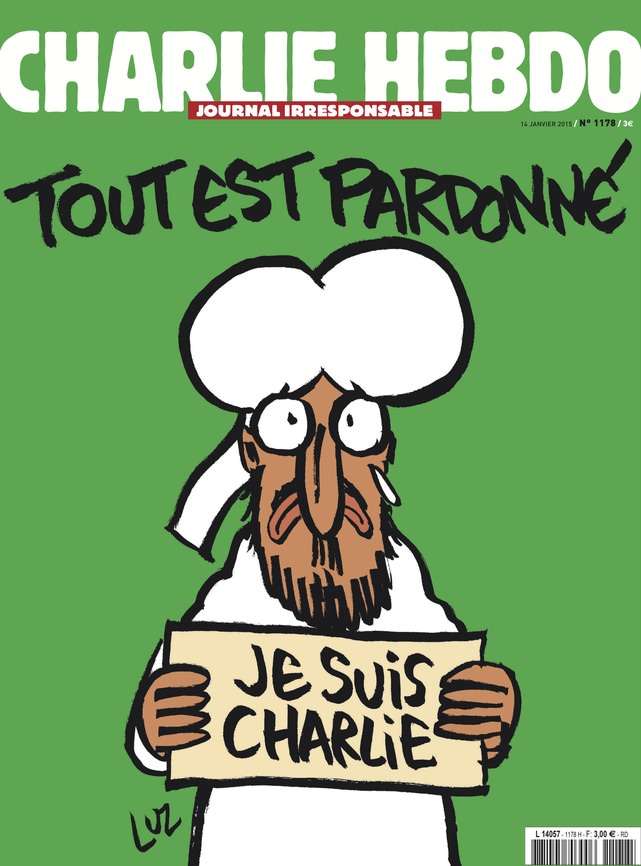Should Muhammad-Depicting Cartoonists Be Executed or Merely Imprisoned?
Pick a position in the Charlie Hebdo debate.

According to The New York Times, the new, post-massacre issue of Charlie Hebdo has "reignited the debate pitting free speech against religious sensitivities that has embroiled Europe since 12 people were killed during an attack on [the paper's] Paris offices by Muslim extremists a week ago." As near as I can tell, these are the four main positions in that debate:
1. No one should be murdered over cartoons, which Charlie Hebdo's staff had a right to draw and publish, no matter how offensive they might be to some people.
2. No one should be murdered over cartoons, but those guys at Charlie Hebdo were kinda asking for it. What did they think would happen if they kept gratuitously attacking Muslim sensibilities?
3. No one should be murdered over cartoons, but they should go to jail if those cartoons insult Islam.
4. People who publish cartoons that insult Islam deserve the death penalty, so killing them is not murder.
While taking Position No. 1, I have encountered various people who take Position No. 2, and last week Anthony Fisher offered a nice sampling. Position No. 3 is exemplified by Elsa Ray, spokeswoman for the Collective Against Islamophobia in France, who told the Times, "The freedom of expression may be guaranteed by the French Constitution, but there is a limit when it goes too far and turns into hatred and stigmatization." Ray is referring to laws that criminalize insults, defamation, and incitement to hatred or discrimination based on religion and various other criteria.
The Times also quotes an advocate of Position No. 4:
A preacher, Anjem Choudary, the former leader of a radical group that was banned in Britain, was quoted by a British newspaper, The Independent, as saying that the image was "an act of war" that would be punishable by death if judged in a Shariah court….
"If freedom of expression can be sacrificed for criminalizing incitement and hatred, why not for insulting the Prophet of Allah?" Mr. Choudary wrote last week on Twitter on the same day as the massacre at Charlie Hebdo, during which the attackers indicated they were avenging Muhammad for the newspaper's insults.
How big a gap is there between Ray's position and Choudary's? Both believe that Islam-insulting cartoons are intolerable and should be punished. They disagree about the appropriate penalty, and possibly also about the propriety of vigilante action to impose the penalty when the government fails to do so.
Choudary couches his argument in terms that should be familiar to supporters of bans on hate speech, and he asks a good question: "If freedom of expression can be sacrificed for criminalizing incitement and hatred, why not for insulting the Prophet of Allah?" The Times notes that "Prime Minister Manuel Valls told the National Assembly on Tuesday that 'blasphemy' was not in French law and never would be." That is technically true: Religious insults are part of a broader class that includes insults based on race, ethnicity, national origin, sex, sexual orientation, and disability. Furthermore, the victims are not Allah and his prophet but their followers. But if the upshot is that someone goes to jail for drawing a picture of Muhammad, a ban on religious insults in practice looks a lot like a ban on blasphemy.
Then again, no one has actually been imprisoned (or fined) in France for publishing Muhammad cartoons. The 2006 case against Charlie Hebdo failed because a judge decided that two of the three cartoons at issue targeted fundamentalists, as opposed to Muslims in general, while the third was reprinted in the context of covering a controversy, meaning that the requisite intent to insult was missing. An appeals court concluded that none of the cartoons was an attack on Muslims per se. A blasphemy ban probably would not draw such fine distinctions.
Choudary argues that the French government's tolerance of the Muhammad cartoons, together with its crackdown on the comedian Dieudonné M'Bala M'Bala, betrays a double standard: It is OK to insult Muslims but not Jews. Prime Minister Valls perceives a "fundamental difference" between Charlie Hebdo's cartoonists and Dieudonné, who has gotten into legal trouble over anti-Semitic comments and was arrested today for expressing sympathy with Amedy Coulibaly, the terrorist who murdered four people at a kosher market in Paris last week. "I feel like Charlie Coulibaly," Dieudonné said on Facebook. Like Valls, I see a difference here, but it is not one that should matter under the law.
Charging the government with making such judgments not only violates freedom of speech but invites enmity among people who take a different view. Many Muslims who who may not agree with Choudary that Muhammad-depicting cartoonists should be killed nevertheless resent what they perceive as unequal treatment of different ethnic groups. As Matt Welch observes, this sort of divisiveness is another cost of trying to police offensive words and images.


Show Comments (53)